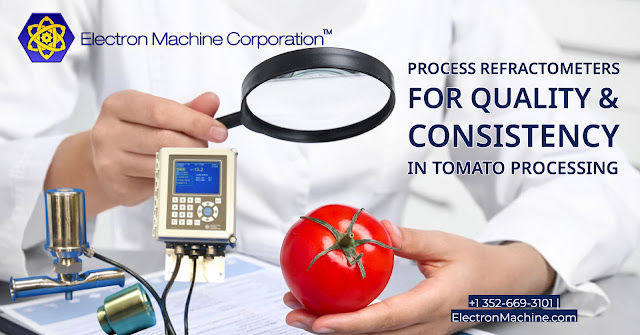This blog focuses on industrial, inline process refractometers and their use in industrial applications. Refractometry is used to measure the refractive index of a substance in order to determine its composition or purity. Posts include information on theory, construction, installation, new products and new markets.
Electron Machine Corporation | Umatilla, FL | PHONE: 352-669-3101 | ElectronMachine.com
Inline Process Refractometers for Tomato Processing
Tomato processors need to anticipate product output, consistency, and quality, as these variables directly impact sales and profitability. However, because of fruit diversity, harvest maturity, and agricultural region, it is challenging to control the consistency and quality of tomato products.
Consumers frequently choose tomato sauces, pastes, purees, and dressings depending on sweetness levels, so food producers must manage sweetness precisely. Brix is the most commonly used method for assessing sweetness. Degrees Brix (°Bx) is a quick and accurate way to calculate the quantity of sugar in an aqueous solution.
Refractometry calculates degrees Brix, and refractometers are the devices used to do so. Refractometers, in essence, use a prism to determine how light bends through a substance. The shift in light direction calculates to particulate quantities - in this example, Brix - in a repeatable manner.
In food processing, there are various types of refractometers. Many food processing labs employ hand-held refractometers for batch sampling. The inline process refractometer is another. It offers Brix measuring control directly on the manufacturing line, and it can be used anytime in the overall process, from the evaporation stages to the concentrated finished product.
Inline process refractometers are mounted using a sanitary-type pipe adapter designed and produced per 3-A Sanitary Standards. Suppose the tomato product is known to leave persistent coatings on the refractometer prism. In that case, a steam port is added to the adapter, allowing the prism to be steam cleaned at predetermined intervals.
The refractometer's head is positioned directly in the processing line and provides real-time Brix detection with a measured output. The refractometer's circuitry then conditions the head's signal and compares it to the desired value in a controller. The controller provides a corrective output signal, such as 4-20mA, to a final control device, such as a control valve. The control device increases or reduces the amount of an ingredient. Brix measurement, like any other process control variable (pressure, temperature, level, or flow), is determined and managed by the inline process refractometer via a dedicated control loop, giving the tomato processor better control over product quality and consistency.
For more information on the use of inline process refractometers in tomato processing, contact Electron Machine at +1 352-669-3101 or visit http://electronmachine.com.
Inline Refractometers for Quality Control and Monitoring in the Pharmaceutical, Food & Beverage, and Chemical Industries
The Inline Process Refractometer is a measurement device used to determine concentration levels in the process media. The combined hardware and software continuously monitor the process in real-time and provide output signals that assist in monitoring and controlling the process.
Inline Process Refractometers accurately measure solids concentration, density, and purity levels. Industries such as sugar, food & beverage, chemical, paper, and pharmaceuticals commonly apply refractometers to their manufacturing processes.
Refractometers measure the amount of light that passes through a sample and then measure its refractive index to determine its concentration or composition. Their primary uses are quality control, product development, process optimization, and research.
Pharmaceutical Industry
The process refractometer is used in pharmaceutical industries to measure the concentration of solids in a solution for quality control, such as checking the purity of water or other liquids. They are used to measure the makeup of solutions containing active ingredients to ensure that they meet predetermined specifications.
Food and Beverage Industry
Industrial refractometers provide a variety of benefits in the food industry. Since the primary function of an Inline Process Refractometer is to measure the concentration of dissolved solids in a liquid, in food processing, they measure sugar content, alcohol content, or water concentration by calibration to measure some specific solute or solutes. These solutes can be either sugars or salts, depending on the application. Companies use Inline process refractometers to produce fruit juices, tomato products, dairy products, sweeteners, jams, and jellies, to determine the sugar content.
Chemical Industry
The chemical industry uses Inline Process Refractometers for the chemical analysis of liquids. They determine the magnitude of dissolved solids in a liquid solution by measuring the angle at which light passes through, assisting in deciding concentrations, and identifying chemical compounds.
In-line Process Refractometer Applications
Food and Beverage
Sanitary refractometers from Electron Machine provide precise in-line Brix, total solids, density, Plato, and concentration readings in applications involving processing liquid foods and beverages in filling lines and waste stream management.
Chemical Manufacturing
Even in the most demanding, hazardous conditions, Electron Machine's Process Refractometers deliver precise and dependable liquid concentration and density readings of any chemicals or compounds in the central processing lines, by-pass lines, or containers.
Sweeteners, Jams, Jellies, Sugar Alternatives, Sugar
Process refractometers from Electron Machine provide precise and trustworthy Brix readings. Supersaturation concentration control, total fructose, and glucose concentration during separation, and Brix
Paper & Pulp Processing
Electron Machine's process refractometers provide black and green liquor solids content and density readings in the kraft chemical (sulfate) and chemical-mechanical pulp manufacturing processes. Refractometers assist the brown stock washing procedure in the fiber line optimization by using measurements of fiber suspensions' dissolved solids content (TDS).
Refining of Oil, Gas, and Petrochemicals
Electron Machine process refractometers offer precise in-line measurements of refractive index, concentration, and density to improve processes such as alkylation, gas treatment, dehydration, and oil production.
Inline Process Refractometers for Industry
Refractometry is the ideal method for efficiently, reliably, and accurately determining substance concentration, identification, or purity. Inline process refractometers are especially helpful as they supplement laboratory research and contribute to product improvement. These process analyzers deliver results within fractions of a second, allowing real-time monitoring and automatic control of processes.
Process refractometers offer the end-user a tool that can be relied upon consistently. They provide a consistent final product, which is essential for various reasons that vary depending on the business that utilizes this equipment. In the pulp and paper industry, managing the process to their desired level enables them to enhance and simplify the whole Kraft process, allowing them to operate at optimum energy efficiency, which is essential given the competitive global market.
The same applies to chemical, food, dairy, and sugar-producing businesses. However, quality control is very crucial. Creating and sustaining brand loyalty is vital, and quality control guarantees quality. Product uniformity each time your client's purchase will help you earn and maintain market share. Not to mention saving money via waste reduction.
The benefits of using inline refractometers are apparent. Manual sampling and laboratory analysis are time-consuming and labor-intensive, making them less efficient and reproducible. The inline process refractometer is the more efficient and dependable option. These instruments provide real-time, inline continuous concentration monitoring and cross-contamination prevention. Furthermore, operators may utilize their time to do other vital tasks, allowing for further time savings and quality improvements.
Subscribe to:
Posts (Atom)






